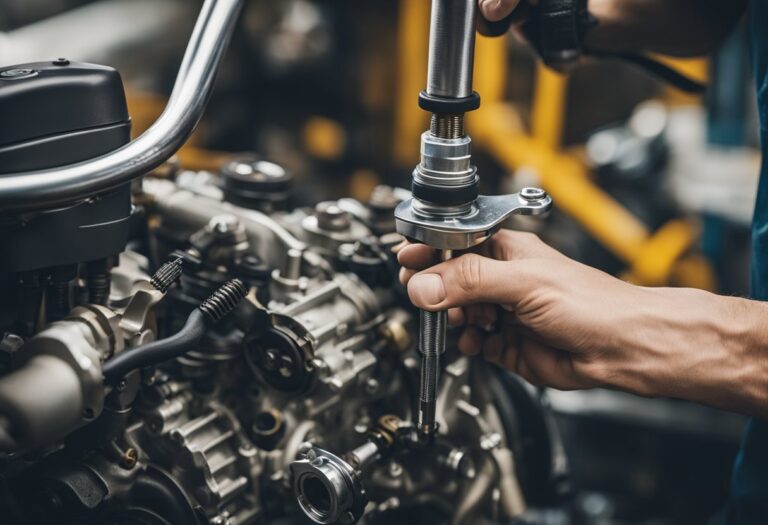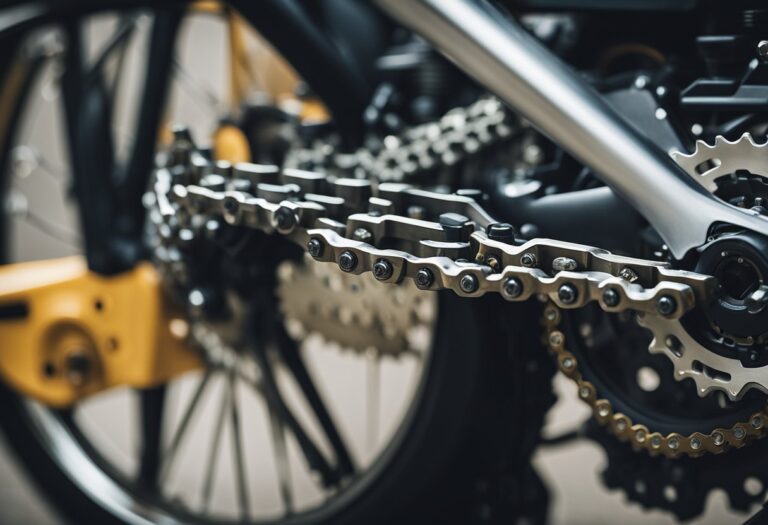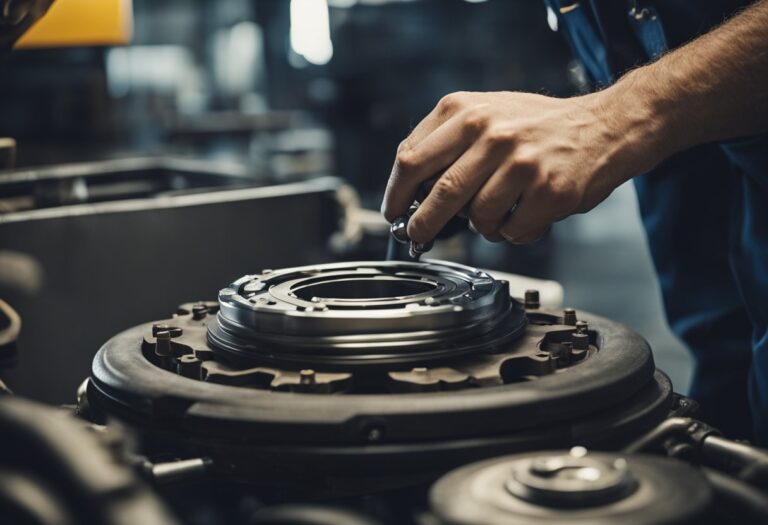Diagnosing Strange Engine Noise: Tips and Tricks for Identifying the Problem
Strange engine noises can be a cause for concern for any driver. Not only can they be annoying, but they can also indicate a serious problem with the engine. Diagnosing the source of the noise can be a challenge, but it’s important to identify the issue before it leads to costly repairs or a breakdown on the road.

Understanding engine sounds is the first step in diagnosing a problem. While some noises may be harmless, others can indicate serious issues such as a damaged piston or engine bearing. It’s important to be able to distinguish between normal engine sounds and those that are abnormal or unusual.
Key Takeaways
- Identifying strange engine noises is crucial in preventing costly repairs or breakdowns on the road.
- Understanding normal engine sounds is key in identifying unusual or abnormal noises.
- Diagnostic tools and techniques can aid in pinpointing the source of the noise.
Understanding Engine Sounds

When it comes to diagnosing strange engine noises, it is important to have a basic understanding of the different sounds an engine can make. By knowing the different types of engine sounds, you can better identify the cause of any unusual noises.
Normal Engine Sounds
First and foremost, it is important to understand what normal engine sounds are. A healthy engine should produce a consistent, smooth sound. This sound can vary depending on the type of engine and the vehicle it is in, but it should generally be a low, humming noise.
Knocking Sounds
One of the most common engine sounds that indicate a problem is knocking. Knocking sounds can be caused by a variety of issues, including worn out bearings, damaged pistons, or loose connecting rods. These sounds are often described as a loud, repetitive knocking noise.
Rattling Sounds
Rattling sounds are another common issue that can indicate a problem with the engine. These sounds can be caused by loose or damaged components, such as a loose timing chain or a damaged valve. Rattling sounds are often described as a metallic, rapid ticking noise.
Whining Sounds
Whining sounds can also indicate a problem with the engine. These sounds are often caused by issues with the alternator, power steering pump, or water pump. Whining sounds are often described as a high-pitched, continuous noise.
Conclusion
By understanding the different types of engine sounds, you can better diagnose any issues with your engine. If you hear any unusual noises, it is important to have your vehicle inspected by a qualified mechanic to identify and fix any problems.
Initial Assessment

When diagnosing strange engine noise, the first step is to conduct an initial assessment. A thorough initial assessment can help identify the root cause of the problem and determine the appropriate course of action.
During the assessment, the mechanic should listen carefully to the engine noise and try to identify its source. They should also inspect the engine for any visible signs of damage or wear, such as leaks, cracks, or loose parts.
It is important to note that engine noise can be caused by a variety of factors, including worn bearings, damaged valves, or a malfunctioning water pump. Therefore, it is crucial to gather as much information as possible during the initial assessment to ensure an accurate diagnosis.
To aid in the assessment, the mechanic may use specialized tools such as a stethoscope or a vibration analyzer. They may also consult the vehicle’s service manual or technical bulletins for information on common issues related to the engine noise.
In summary, a thorough initial assessment is critical when diagnosing strange engine noise. By carefully listening to the noise, inspecting the engine, and utilizing specialized tools and resources, the mechanic can gather the necessary information to accurately diagnose and repair the issue.
Diagnostic Tools and Techniques

Visual Inspection
One of the most basic diagnostic techniques is a visual inspection of the engine. A thorough inspection of the engine can reveal a lot about the condition of the engine and the source of any unusual noises. Start by looking for any obvious signs of damage or wear, such as cracks in the engine block or oil leaks. Check the condition of the belts, hoses, and other components for any signs of wear or damage. Look for any loose or missing bolts or other components that could be causing the noise.
Audio Analysis
Another useful diagnostic tool is audio analysis. A mechanic can use a stethoscope or other audio equipment to listen to the engine and identify any unusual noises. This can be especially useful for identifying noises that are difficult to locate by sight. By listening to the engine at different speeds and under different conditions, a mechanic can often pinpoint the source of the noise.
Vibration Analysis
Vibration analysis is another diagnostic technique that can be used to identify the source of engine noise. By measuring the vibrations of the engine, a mechanic can identify any unusual patterns or frequencies that could indicate a problem. This technique is especially useful for identifying problems with the engine’s bearings or other moving parts.
Diagnostic Equipment
In addition to these basic diagnostic techniques, there are a number of specialized diagnostic tools and equipment that can be used to diagnose engine noise. These include engine analyzers, oscilloscopes, and other diagnostic equipment. These tools can be used to measure a wide range of engine parameters, including fuel pressure, ignition timing, and exhaust emissions. With the help of these tools, a mechanic can quickly and accurately diagnose the source of any unusual engine noise.
Common Engine Noises and Causes

Knocking
Knocking is a common engine noise that can be caused by several factors, including worn bearings, damaged pistons, or improper fuel combustion. If the knocking noise is heard when the engine is cold, it could be due to low oil pressure or oil viscosity. If the knocking noise is heard when the engine is hot, it could be due to worn bearings or damaged pistons.
Hissing
Hissing is another common engine noise that can be caused by several factors, including a vacuum leak, a damaged exhaust manifold, or a damaged intake manifold gasket. If the hissing noise is heard when the engine is cold, it could be due to a vacuum leak. If the hissing noise is heard when the engine is hot, it could be due to a damaged exhaust manifold or intake manifold gasket.
Squealing
Squealing is a common engine noise that can be caused by several factors, including a worn or damaged belt, a loose belt tensioner, or a damaged pulley. If the squealing noise is heard when the engine is cold, it could be due to a loose belt tensioner. If the squealing noise is heard when the engine is hot, it could be due to a worn or damaged belt or pulley.
Clicking
Clicking is another common engine noise that can be caused by several factors, including a worn or damaged lifter, a damaged pushrod, or a damaged rocker arm. If the clicking noise is heard when the engine is cold, it could be due to a worn or damaged lifter. If the clicking noise is heard when the engine is hot, it could be due to a damaged pushrod or rocker arm.
It is important to diagnose the cause of any strange engine noise as soon as possible to prevent further damage to the engine. If you are unsure of the cause of the noise, it is recommended to take your vehicle to a qualified mechanic for inspection and repair.
Troubleshooting by Engine Area

Belt and Pulley Related Noises
When diagnosing strange engine noises, it is important to start by checking the belts and pulleys. A loose or damaged belt can cause a squealing or whining noise, while a damaged pulley can cause a rattling or grinding noise.
To troubleshoot belt and pulley related noises, inspect the belts for signs of wear or damage, such as cracks or fraying. Check the tension of the belts and tighten or replace them as necessary. Inspect the pulleys for signs of damage, such as cracks or chips, and replace them if needed.
Valvetrain Components
Valvetrain components, such as the lifters, pushrods, and rocker arms, can also cause strange engine noises. A ticking or tapping noise may indicate a problem with the valvetrain.
To troubleshoot valvetrain-related noises, check the oil level and quality. Low oil pressure or dirty oil can cause problems with the valvetrain. Inspect the lifters, pushrods, and rocker arms for signs of wear or damage, and replace them if necessary.
Cylinder Compression Issues
Cylinder compression issues can cause a variety of engine noises, including knocking, pinging, or rattling. Low compression can cause a lack of power and poor performance.
To troubleshoot cylinder compression issues, perform a compression test on each cylinder. If the compression is low, check the valves and piston rings for signs of wear or damage. Replace any worn or damaged components as needed.
Exhaust System Irregularities
Problems with the exhaust system can also cause strange engine noises. A loose or damaged exhaust pipe can cause a rattling or banging noise, while a damaged muffler can cause a hissing or popping noise.
To troubleshoot exhaust system-related noises, inspect the exhaust system for signs of damage, such as cracks or holes. Tighten any loose connections and replace any damaged components.
Interpreting Diagnostic Results

After conducting a thorough diagnosis of the engine noise, the mechanic will be able to interpret the results and determine the root cause of the issue. The following are some common diagnostic results and their corresponding interpretations:
- Loud knocking noise: If the engine produces a loud knocking noise, it could indicate a problem with the engine bearings or crankshaft. This type of noise is usually heard when the engine is under load, and it may get louder as the RPMs increase.
- Squealing or screeching noise: A high-pitched squealing or screeching noise could indicate a problem with the engine belts or pulleys. This type of noise is usually heard when the engine is idling or when the vehicle is accelerating.
- Whining or humming noise: A whining or humming noise could indicate a problem with the transmission or differential. This type of noise is usually heard when the vehicle is in motion, and it may get louder as the vehicle speeds up.
- Rattling or grinding noise: A rattling or grinding noise could indicate a problem with the engine valves, pistons, or camshaft. This type of noise is usually heard when the engine is running, and it may get louder as the RPMs increase.
It is important to note that these interpretations are not definitive and may vary depending on the specific make and model of the vehicle. Therefore, it is recommended that the mechanic consults the manufacturer’s service manual or technical support hotline for further guidance.
In addition to interpreting the diagnostic results, the mechanic must also consider the severity of the issue and the potential consequences of not repairing it. For example, if the engine is producing a loud knocking noise, it could lead to catastrophic engine failure if left unaddressed. On the other hand, if the engine is producing a minor squealing noise, it may not pose an immediate threat to the vehicle’s safety or performance.
Ultimately, the mechanic must use their expertise and judgment to determine the best course of action for repairing the engine noise and ensuring the vehicle’s reliability and safety.
Professional Assistance and Services

When it comes to diagnosing strange engine noises, seeking professional assistance and services can be the best option. A qualified mechanic will have the knowledge and experience to accurately diagnose the issue and provide appropriate solutions.
One option is to take the vehicle to a dealership or repair shop that specializes in the make and model of the vehicle. These professionals have access to specialized tools and diagnostic equipment that can help them identify the cause of the noise.
Another option is to seek the services of an independent mechanic. These professionals may be more affordable and can provide a more personalized approach to diagnosing and repairing the issue.
It is important to choose a reputable and experienced mechanic who has a proven track record of successfully diagnosing and repairing engine issues. Before agreeing to any repairs, it is recommended to get a detailed estimate of the costs involved and to ask for a warranty on the work performed.
In some cases, a professional may recommend replacing the entire engine rather than attempting to repair it. This can be a costly option, but may be necessary if the engine is severely damaged or has reached the end of its lifespan.
Overall, seeking professional assistance and services can save time and money in the long run by accurately diagnosing and repairing engine issues.
Preventive Measures and Maintenance

To prevent strange engine noises from occurring in the first place, it is important to perform regular maintenance on the vehicle. This can include changing the oil and oil filter, checking and replacing worn belts and hoses, and ensuring that the engine is properly lubricated.
Regularly checking and maintaining the engine’s cooling system can also help prevent strange noises from occurring. This includes checking the coolant level and ensuring that the radiator and hoses are free from leaks or damage.
In addition to regular maintenance, it is important to drive the vehicle responsibly and avoid harsh driving habits such as sudden acceleration or hard braking. These types of driving behaviors can put unnecessary stress on the engine and lead to strange noises.
If a strange noise is heard while driving, it is important to address the issue as soon as possible. Ignoring the noise can lead to further damage and more costly repairs.
Overall, by performing regular maintenance and driving responsibly, vehicle owners can help prevent strange engine noises from occurring and ensure that their vehicle runs smoothly and reliably.
Frequently Asked Questions

What are common causes of engine noise at idle?
Engine noise at idle can be caused by various factors, including worn out bearings, low oil pressure, or damaged engine parts. Other common causes include faulty lifters, loose belts, or a malfunctioning water pump. It is important to have a professional mechanic diagnose the cause of the noise to prevent further damage to the engine.
How can you tell if engine noise indicates a serious problem?
If the engine noise is accompanied by other symptoms such as rough idling, loss of power, or decreased fuel efficiency, it may indicate a serious problem. Additionally, if the noise gets louder or more frequent over time, it may be a sign of a more severe issue. A professional mechanic can help diagnose the problem and recommend the appropriate repairs.
What steps should be taken to diagnose an engine that sounds loud when accelerating?
When diagnosing an engine that sounds loud when accelerating, it is important to first identify the source of the noise. This may involve checking the exhaust system, engine mounts, or other components. Once the source of the noise is identified, a mechanic can perform further diagnostic tests to determine the underlying cause of the problem.
Are there specific noises that suggest a failing engine?
Yes, there are several specific noises that may indicate a failing engine. These include knocking, tapping, or grinding sounds, as well as excessive vibration or smoke from the exhaust. If any of these symptoms are present, it is important to have the engine inspected by a professional mechanic as soon as possible.
What is the best way to identify the source of an abnormal engine noise?
The best way to identify the source of an abnormal engine noise is to perform a thorough visual inspection of the engine components. This may involve removing the valve covers, oil pan, or other parts to get a closer look. Additionally, a mechanic may use diagnostic tools such as a stethoscope or engine analyzer to pinpoint the source of the noise.
How can one differentiate between normal and unusual engine sounds?
Normal engine sounds are typically consistent and predictable, while unusual engine sounds may be irregular or change over time. Additionally, normal engine sounds should not be excessively loud or accompanied by other symptoms such as rough idling or decreased power. If in doubt, it is always best to have a professional mechanic inspect the engine to ensure that everything is functioning properly.





